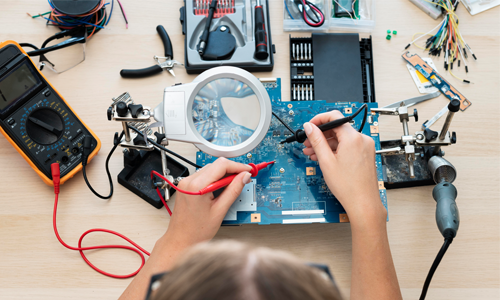Electronics The Ultimate Guide for Beginners

Advanced Electronics
Advanced electron..s refers to the study and development of complex electronic systems, including microprocessors, microcontrollers, and integrated circuits. These systems are used in a wide range of industries, from aerospace and defense to telecommunications and medical devices. Advanced electronic also includes the design and development of high-speed digital systems, such as those used in supercomputers and data centers.
Advanced electronic require a deep understanding of circuit design, digital signal processing, and advanced programming techniques. It also involves staying up to date with the latest advancements in semiconductor technology, which is constantly evolving.
Advanced electronic can be a challenging and rewarding field, with many opportunities for innovation and discovery. Careers in advanced electronic can include research and development, product design, and testing and validation. As electronic systems continue to become more complex and integrated into every aspect of modern life, the demand for experts in advanced electronic is only expected to grow.
Table of Contents
Definition of Electronics
Electronics is a branch of science that deals with the behavior and control of electrons (or electrically charged particles) in circuits, devices, and systems.
Brief History of Electronics
The history of electronic dates back to the late 19th century when the first vacuum tube was invented. Since then, there have been numerous advancements in electronic, including the invention of transistors, integrated circuits, and microprocessors.
Understanding Basic Electronics
Basic electronic involves the study of electronic components, such as resistors, capacitors, and transistors, and their behavior within circuits. Circuits can be either analog or digital and can include power supplies, amplifiers, and oscillators. Understanding basic electronic is essential for anyone interested in working with or repairing electronic devices, as well as for those pursuing careers in fields such as engineering or computer science.
Electric Charge and Current
Electricity is an essential phenomenon that causes matter to experience an electromagnetic force. The flow of electric charge through a circuit is referred to as electric current.
Voltage, Current, and Resistance

Voltage is the electric potential difference between two points in a circuit, while current is the flow of electric charge through the circuit. The hindrance or impedance that restricts the movement of electric charge is known as resistance.
Ohm’s Law

Ohm’s Law is the fundamental law of electricity that relates voltage, current, and resistance. Ohm’s law states that the amount of electric current that flows through a circuit is directly proportional to the voltage applied and inversely proportional to the resistance in the circuit.
Basic Electronic Components
There are various electronic components that are essential for building electronic circuits, including resistors, capacitors, diodes, and transistors.
Electronic Devices and Systems
Electronic devices and systems refer to any technology that uses electronic circuits to perform specific functions. These can include devices such as smartphones, laptops, and televisions, as well as more specialized systems like medical equipment, navigation systems, and industrial automation systems. These devices and systems rely on a variety of electronic components and technologies, such as microprocessors, sensors, and wireless communication protocols. Understanding electronic devices and systems is crucial for developing and maintaining modern technologies and can lead to careers in fields such as electrical engineering, computer engineering, and software development.
Digital Electronics
Digital electronic is a specialized area of electronic that is concerned with the processing and manipulation of discrete signals that have distinct on and off states. It involves the use of logic gates, flip-flops, and microprocessors.
Analog Electronics
The field of electron..s that focuses on the processing and manipulation of unbroken signals is referred to as analog electronic. It involves the use of amplifiers, filters, and oscillators.
Consumer Electron..s
Consumer electronic are electronic devices that are designed for everyday use, such as televisions, smartphones, and computers.
Industrial Electron..s
Industrial electronic are electronic devices that are designed for industrial applications, such as control systems, power supplies, and motor drives.
Microelectronics
Microelectronic is a specialized branch of electronic that involves the creation and development of electronic circuits and devices on a minuscule scale.
Nanoelectronics
Nanoelectronics is a branch of electronic that deals with the design and fabrication of electronic circuits and devices on a nanoscale.
Optoelectronics
Optoelectron..s is a branch of electronic that deals with the design and fabrication of electronic devices that interact with light, such as LEDs, lasers, and photovoltaic cells.
Power Electron..s
The field of electronic that is focused on the design and implementation of power circuits is known as power electronic. and control of electronic circuits and devices that convert and control electrical power.
Conclusion
In conclusion, electron..s is a fascinating subject that has transformed the world we live in today. From the basic electronic components to complex electronic devices and systems, there is so much to learn and explore. Whether you are a beginner or an advanced user, there is always something new to discover in the world of electronic.
FAQs
Analog and digital electronic are two distinct branches of electronic that differ in their approach to processing signals, with analog electronic dealing with continuous signals, while digital electronic operates on signals that are discrete in nature?
The field of analog electronic is focused on the handling of continuous signals, whereas digital electronic specializes in the processing and manipulation of signals that are discrete in nature.
What is microelectronics?
Microelectronics is a specialized discipline within the broader field of electronic, which is concerned with the creation and production of electronic circuits and devices that are extremely small in size.
What are some common electronic components?
Several electronic components that are widely used in various electronic circuits include resistors, capacitors, diodes, and transistors.
What is power electron..s?
Power electron..s is a field within electronic that is focused on the development and implementation of electronic circuits used for power conversion and management.
May You Like : Transistor The Building Block of Modern Electronics


6 thoughts on “Electronics The Ultimate Guide for Beginners”